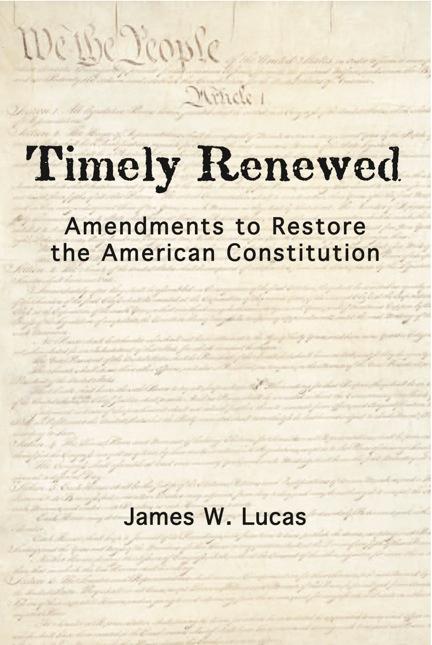Wisconsin Pro Publica and some regional newspapers have just published a lengthy report on a new push to amend the U. S. Constitution through the call of a convention under Article V. This Article, which governs how the Constitution is amended, provides that Congress should call a convention to propose amendments “on the Application of . . . → Read More: Can Congress be Compelled to Call a Constitutional Convention?
|
|||||
|
By framing the fundamental issue as judicial amendment vs. democratic amendment, originalists can make clear that they are defending democratic government, not the dead hand of history as portrayed so often by their opponents. However, unlike regular laws, which can be readily amended by current legislatures, the Constitution can only be democratically changed by the lugubrious procedures of Article V. Therefore, originalists need to actively advocate reform of Article V. . . . → Read More: The Missing Half of Originalism The DNC chairman’s misstatement was not an inadvertent error. In fact, it reflected an attitude toward the Constitution which is common in the modern Left. . . . → Read More: Why the Electoral College is Not in Tom Perez’ Constitution Our current winner-takes-all Electoral College system for electing our President is not what the Framers intended. However, direct popular election risks tearing apart our already divided nation. Fifty States, Not Six proposes a bipartisan solution which accommodates both Democrats and Republicans and assures that every citizen’s vote counts. . . . → Read More: Fifty States, Not Six – Reforming the Election Process A new post-election edition of Are We the People? has been released. . . . → Read More: New Post-Election Edition of Are We the People? New editions have been released for both Are We the People?: How We the People Can Take Charge of Our Constitution and Timely Renewed: Amendments to Restore the American Constitution. The primary feature of both is the latest version of the Amendment Amendment to reform Article V. . . . → Read More: New Revised Editions Released for Are We the People? and Timely Renewed Even with the most extensive Republican control of state legislatures in almost a century, constitutional conservatives still fall short of the 34 states needed to call an Article Five Convention of the States. Americans seeking to restore the constitutional balance between state and federal power would be well served to also promote reform of Article Five itself to eliminate the requirement that the states go through the archaic and unworkable mechanism of a convention in order to initiate amendments to the Constitution. . . . → Read More: Amending the Constitution to Constrain Federal Power: There Is An Alternative to a Doomed Convention of the States Retired Supreme Court Justice John Paul Stevens has written a book proposing six amendments to the Constitution. Whatever their substantive merits, these opinions are all very poorly drafted. They leave too much discretion in the hands of judges, and even can be reasonably read to defeat Stevens’ objectives in proposing them. . . . → Read More: Six (Poorly Drafted) Amendments Mark Levin has directed attention to the use of the amendment power to restore constitutional government. However, the use of a state-called convention to accomplish this is very problematic from a procedural point of view, let alone concerns for a “runaway” convention. The better approach is to first adopt Levin’s and others’ suggestion that we amend Article V to permit states to initiate amendments without having to go through a convention. . . . → Read More: A Convention To Implement the Liberty Amendments? |
|||||
|
Copyright © 2025 Timely Renewed - All Rights Reserved |
|||||



Why Should Donald Trump, Bill de Blasio and I Get Extra Votes?
The question about citizenship is needed on the 2020 Census so that we can apportion on the principle of “one person, one vote” as articulated by the Supreme Court in the 1960s. . . . → Read More: Why Should Donald Trump, Bill de Blasio and I Get Extra Votes?